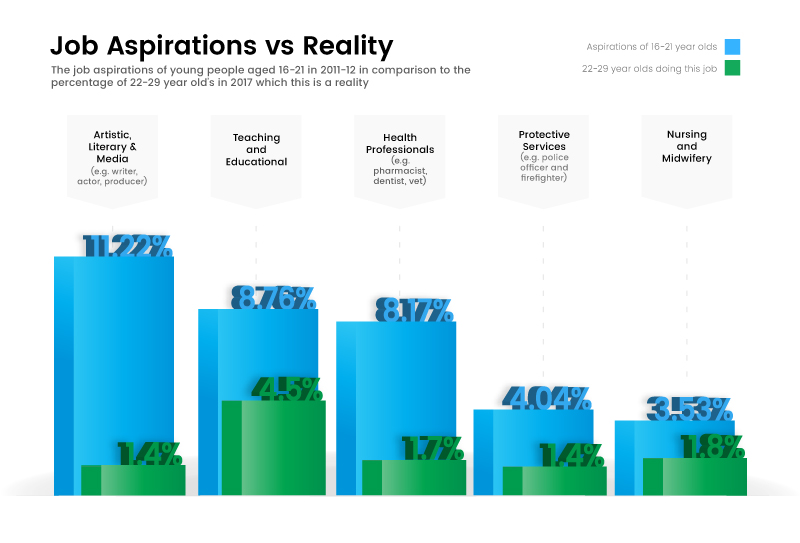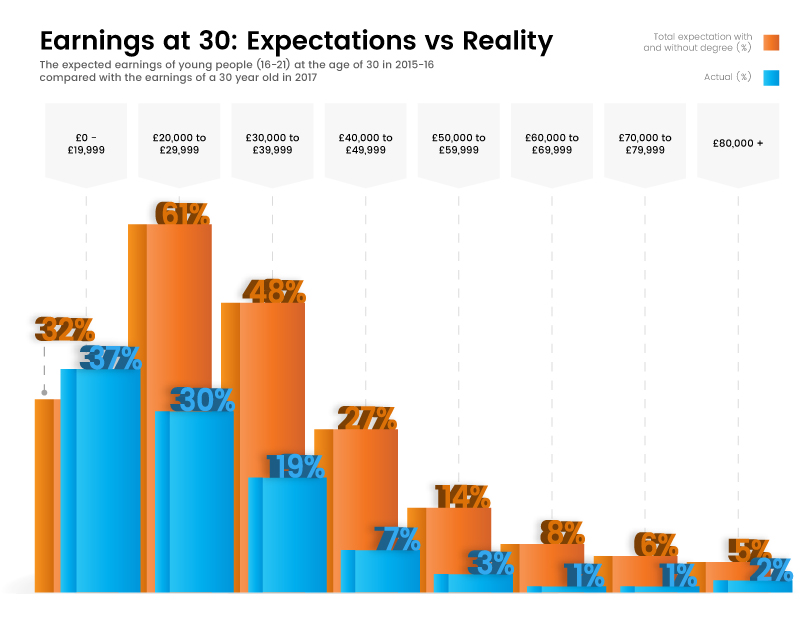When you start in the world of work after finishing school, you imagine working up the corporate ladder until you eventually achieve a salary that you expect can sustain yourself. In new figures however, it seems that a lot of us are falling short of these expectations.
Deciding what you want to be when you’re older is by no means feat, with a large majority of young people still unsure on how they wish to spend their working hours even after completing three or more years at university. However, many can relate to the job aspirations of young people, with careers such as Doctor, Nurse, Teacher, Sportsmen or Emergency services among the most commonly cited.
A recent report supported by University College London (UCL) found that 36 per cent of children aged seven-plus base their career aspirations on people they know, and the 45 per cent of those that didn’t, stated film and TV was the biggest influence on their future job choice.
However, according to a new study conducted by YouGov.co.uk for the Confederation of British Industry (CBI), 49 per cent of young people do not feel prepared for the world of work. With 21 per cent stating they feel there is a lack of opportunities in the sector they wish to work in.
As a result, training and qualification provider TheKnowledgeAcademy.com sought to uncover the realities of young people in the UK job market, though an analysis of research conducted by The Office for National Statistics.
It was discovered that whilst the variety of jobs available has changed, job aspirations seemingly have not. In 2015-16 the top five jobs 16-21-year olds wanted to do when they were older was unchanged from the same age group back in 2010-11.
Interestingly, The Knowledge Academy discovered that the proportion of people that ended up landing their dream job is few and far between. 11.22 per cent stated they aspired to work in the Artistic, Literary and Media sector. However, the stark reality is that only 1.4 per cent were recorded to be working within this field in 2017.
In fact, the top three jobs most aspired by those aged 16-21 showed a decline when compared to the actual proportion of those aged 22-29 working in the sector:
Teaching and Education (8.76% vs. 4.5%), Health Professionals (8.17% vs. 1.7%), Protective services (4.04% vs. 1.4%)
The Knowledge Academy can also reveal the striking differences between the expected earnings of 16-21-year olds by the age of 30 compared to the real-life earnings of a 30-year-old in 2017.
It may come as a surprise, but 32 per cent of 16-21-year olds expected to be earning from £0-£19,999 by the time they were 30 in 2015-16 (including with a degree and without). Of this, 7 per cent expected to be earning within this bracket if they had a degree, whilst 25 per cent stated that they predicted to earn this much without a degree. Fascinatingly, they weren’t far off with 37 per cent earning this salary.
The following differences in expected vs. real earnings were also discovered:
- £20,000-£29,999: 61% vs. 30% (61% spilt into 21% with a degree and 40% without)
- £30,000-£39,999: 48% vs. 19% (48% spilt into 30% with a degree and 18% without)
- £40,000-£49,999: 27% vs. 7% (27% spilt into 19% with a degree and 8% without)
- £50,000-£59,999 with 14% expecting to earn (10% with a degree and 4% without) vs.
the 3% of 30 year-olds who have this salary.
Only eight per cent (6% with a degree and 2% without) expecting to earn between £60,000-£69,999 vs. the one per cent who earn that figure each year.

















